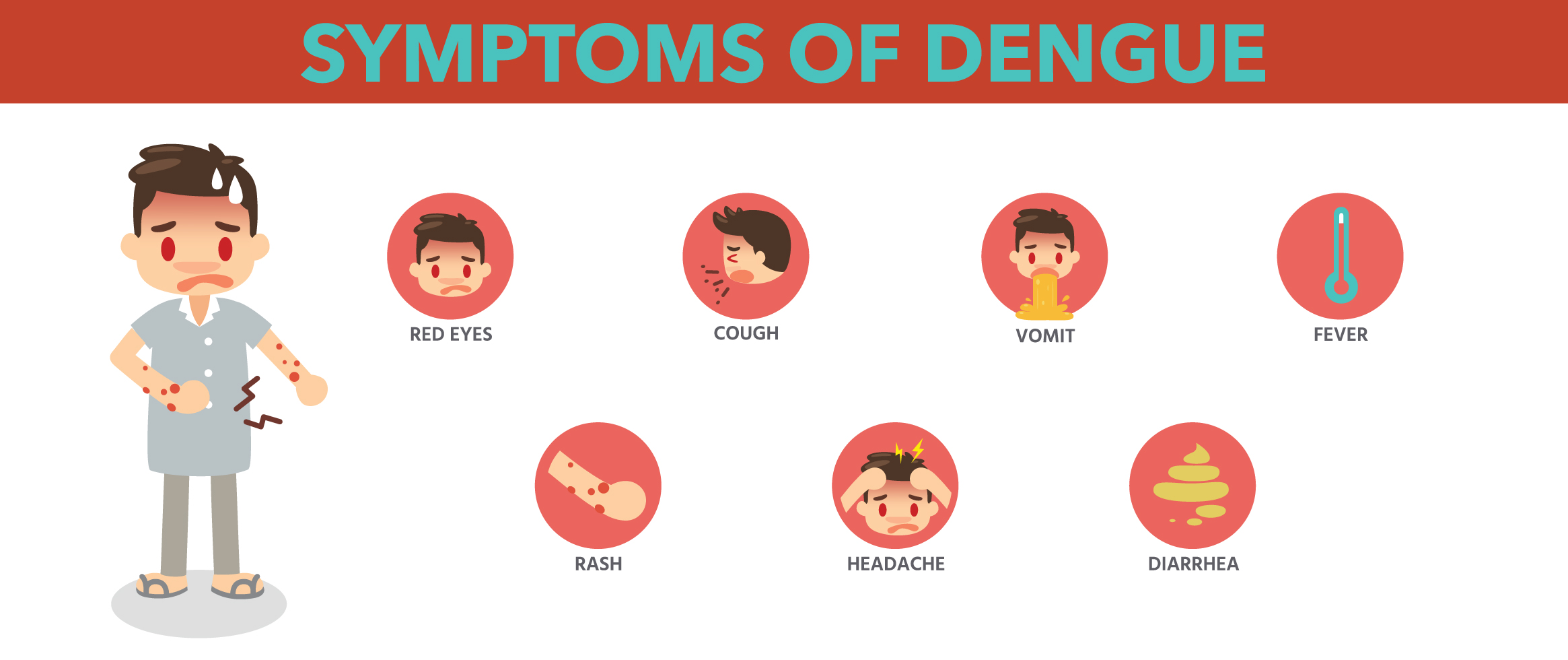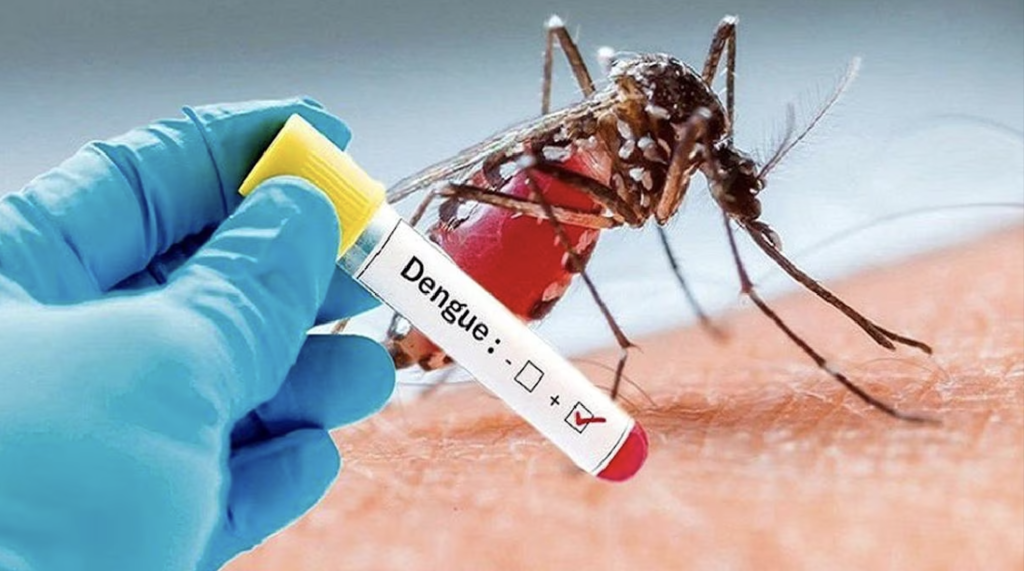Dengue Fever Symptoms-various aspects-
Dengue fever, commonly referred to as “breakbone fever,” is marked by a sudden onset of high fever, severe headaches, and significant joint and muscle pain, accompanied by other flu-like symptoms such as nausea, vomiting, and a rash.


Here’s a more detailed breakdown of dengue fever symptoms:
Common Symptoms:
High Fever: A sudden occurrence of high fever, frequently reaching as high as 104°F (40°C), is a signature characteristic of dengue fever.
Severe Headache: Intense headaches, particularly behind the eyes, are prevalent.
Joint and Muscle Pain: Dengue is occasionally referred to as “breakbone fever” due to the extreme pain experienced in the joints and muscles.
Nausea and Vomiting: Experiencing nausea and vomiting are common gastrointestinal symptoms.
Skin Rash: A rash might emerge a few days after the fever begins.
Fatigue: Profound tiredness and weakness are frequent.
Swollen Glands: Swollen lymph nodes are also noted as a symptom.
Loss of taste and appetite.
Warning Signs of Severe Dengue:
Severe Abdominal Pain: Intense pain experienced in the abdomen.
Persistent Vomiting: Continuous vomiting, particularly if there is an inability to retain fluids.
Bleeding: Occurrences of bleeding from the nose or gums, or the presence of blood in urine or stool.
Bleeding under the skin: which may appear as bruising.
Lethargy or Restlessness: A feeling of extreme tiredness or restlessness.
Rapid Breathing: Experiencing difficulty breathing or fast breathing.
Liver Enlargement: In certain situations, the liver may become enlarged.
Progressive increase in hematocrit (i. e. , hemoconcentration).
If Any Patient of ENT Requires Any Surgery, Opd Consultation Or Online Consultation In Clinic of ENT Specialist Doctor Dr. Sagar Rajkuwar ,He May Contact Him At The Following Address-
Prabha ENT Clinic, Plot no 345,Saigram Colony, Opposite Indoline Furniture Ambad Link Road ,Ambad ,1 km From Pathardi Phata Nashik ,422010 ,Maharashtra, India-Dr. Sagar Rajkuwar (MS-ENT), Cell No- 7387590194, 9892596635
Symptoms
Most individuals with dengue experience mild or no symptoms and will recover in 1–2 weeks. In rare instances, dengue can be severe and result in death.


If symptoms manifest, they typically start 4–10 days post-infection and persist for 2–7 days. Symptoms might comprise:
high fever (40°C/104°F)
severe headache
pain behind the eyes
muscle and joint pains
nausea
vomiting
swollen glands
rash.
Those who are infected for the second time face a heightened risk of severe dengue.
Severe dengue symptoms often emerge after the fever has subsided:
severe abdominal pain
persistent vomiting
rapid breathing
bleeding gums or nose
fatigue
restlessness
blood in vomit or stool
being very thirsty
pale and cold skin
feeling weak.
Individuals exhibiting these severe symptoms should seek care immediately.
Following recovery, individuals who have experienced dengue may feel fatigued for several weeks.
Diagnostics and Treatment
No specific treatment exists for dengue. The emphasis is on alleviating pain symptoms. Most cases of dengue fever can be managed at home with pain medication.


Acetaminophen (paracetamol) is commonly utilized to manage pain. Non-steroidal anti-inflammatory drugs such as ibuprofen and aspirin are avoided as they can elevate the risk of bleeding.
Hospitalization is often required for individuals with severe dengue.
Transmission
Transmission through the mosquito bite
The dengue virus is passed to humans through the bites of infected female mosquitoes, mainly the Aedes aegypti mosquito. Other species within the Aedes genus can also serve as vectors, but their role is typically secondary to Aedes aegypti.
After feeding on an infected person, the virus reproduces in the mosquito midgut before spreading to secondary tissues, including the salivary glands. The duration from ingesting the virus to actual transmission to a new host is referred to as the extrinsic incubation period (EIP). The EIP lasts about 8–12 days when the surrounding temperature is between 25–28°C. Changes in the extrinsic incubation period are not only determined by ambient temperature; various factors such as the extent of daily temperature changes, virus genotype, and initial viral concentration can also modify the time it takes for a mosquito to transmit the virus. Once the mosquito becomes infectious, it can spread the virus for the remainder of its life.
For update on further important health related topics and frequently asked questions on health topics by general population please click on the link given below to join our WhatsApp group –
https://chat.whatsapp.com/Lv3NbcguOBS5ow6X9DpMMA
Human-to-mosquito transmission
Mosquitoes can become infected by humans who are viremic with the dengue virus. This can be an individual who has a symptomatic dengue infection, someone who has not yet developed symptoms (they are pre-symptomatic), and also someone who shows no clinical signs of illness (they are asymptomatic).
Human-to-mosquito transmission can take place up to 2 days prior to an individual exhibiting symptoms of the illness, and up to 2 days after the fever has subsided.
The likelihood of mosquito infection is positively correlated with high viremia and elevated fever in the patient; in contrast, high levels of DENV-specific antibodies are linked with a reduced risk of mosquito infection. Most individuals are viremic for approximately 4–5 days, but viremia can persist for as long as 12 days.
Maternal transmission
The main method of dengue virus transmission between humans involves mosquito vectors. Nonetheless, there is evidence supporting the possibility of maternal transmission (from a pregnant mother to her newborn). At the same time, vertical transmission rates seem low, with the risk of vertical transmission appearing to be connected to the timing of the dengue infection throughout the pregnancy. When a mother experiences a dengue infection while pregnant, infants may encounter issues such as pre-term birth, low birthweight, and fetal distress.
Other transmission modes
Uncommon instances of transmission through blood products, organ donations, and transfusions have been documented. Likewise, transovarial transmission of the virus within mosquitoes has also been reported.
How long does dengue fever last?
Dengue fever symptoms typically manifest 4 to 10 days following a mosquito bite and may persist for 2 to 7 days, with the majority of individuals recuperating within a week.
Here’s a more detailed explanation:
- Incubation Period: The interval between the mosquito bite and the onset of symptoms (incubation period) generally ranges from 4 to 10 days, although it can vary from 3 to 14 days.
- Duration of Symptoms: After symptoms manifest, they generally continue for 2 to 7 days.
- Recovery: The majority of individuals affected by dengue fever recover within around a week.
- Severe Dengue: In certain instances, dengue may escalate to a severe form, where symptoms deteriorate and could potentially become life-threatening. This condition is known as severe dengue, dengue hemorrhagic fever, or dengue shock syndrome.
- Warning Signs of Severe Dengue: Warning signals of severe dengue may arise rapidly, often within the initial day or two following the fever’s decline, and can comprise intense abdominal pain, continuous vomiting, bleeding, and fatigue.
- Treatment: Although there is no specific antiviral remedy for dengue fever, supportive treatment, which includes fluid replacement, can aid in symptom management and help avert complications.
FOR INFORMATION IN GREAT DETAIL ON Dengue Fever Treatments PL CLICK ON THE LINK GIVEN BELOW-It Is Always Better To View Links From Laptop/Desktop Rather Than Mobile Phone As They May Not Be Seen From Mobile Phone. ,In Case Of Technical Difficulties You Need To Copy Paste This Link In Google Search. In Case If You Are Viewing This Blog From Mobile Phone You Need To Click On The Three Dots On The Right Upper Corner Of Your Mobile Screen And ENABLE DESKTOP VERSION.
If Any Patient of ENT Requires Any Surgery, Opd Consultation Or Online Consultation In Clinic of ENT Specialist Doctor Dr. Sagar Rajkuwar ,He May Contact Him At The Following Address-
Prabha ENT Clinic, Plot no 345,Saigram Colony, Opposite Indoline Furniture Ambad Link Road ,Ambad ,1 km From Pathardi Phata Nashik ,422010 ,Maharashtra, India-Dr. Sagar Rajkuwar (MS-ENT), Cell No- 7387590194, 9892596635
Issued in public interest by –
www.entspecialistinnashik.com



